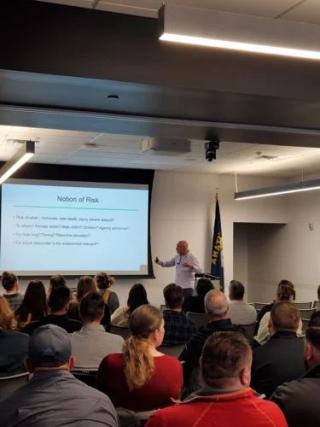Gallatin County Law Enforcement Agencies to Pilot Domestic-Violence Questionnaires

Gallatin County law enforcement will soon be asking seven simple questions of survivors on every domestic violence call they take – a pilot project that advocates say will not only save lives, but that will also be the first of a wave of such questionnaires being implemented across Montana police departments and court systems.
The questionnaires, known as risk assessments:
- provide a uniform way for patrol officers, prosecutors, shelter coordinators, and victim advocates to identify survivors in the highest level of danger (ie does their abuser have access to firearms, is there a history of strangulation)
- can inform judges as they set bail and release conditions for abusers
- help survivors recognize when they might be in danger
The pilot program is slated to start following an Arizona State University (ASU) training in Bozeman for local law enforcement, court personnel, and advocates on Oct. 19-20. Led by ASU’s law-enforcement director Greg Giangobbe and ASU’s Family Violence Center director Neil Websdale, the training focuses on Dr. Websdale’s widely used method of assessing risk. More information about this method is available here.
Bozeman will be piloting the questionnaires right after the training; Gallatin County will do as well. Kalispell, Helena, and Missoula are to follow in the coming year.
Dave Ferguson, Detective, Bozeman Police Department: "Bozeman PD is committed to reducing homicides and to keeping victims of domestic violence from falling through the cracks in the system, and these risk assessments have been proven to do that in other jurisdictions where they've been implemented. BPD will begin training patrol in the use of these assessments starting next week."
Dan Springer, Gallatin County Sheriff: “The Sheriff’s Office is excited to attend the lethality assessment training. We believe implementing these procedures will make victims of domestic violence safer, it will connect them to needed services and it will keep dangerous people from inflicting future harm. We recognize the importance of consistency across all agencies and their response to these calls and this training will continue to improve upon that consistency.”
Audrey Cromwell, Gallatin County Attorney: “I am proud that our County is using evidence-based criminal justice tools to ensure the safety of our most vulnerable community members. This tool will help us effectively and efficiently address domestic violence calls and provide immediate support for victims. I’m thankful that our law enforcement partners across the County have come together to approve the use of a uniform tool to address family violence and keep victims safe and supported.”
Erica Aytes Coyle, executive director, Haven: “At Haven, we've always believed that this community has the power to create change. These new risk assessments show this to be true: Law enforcement, advocates, courts, and victim services are all collaborating to save lives, and to help domestic violence survivors recognize danger and connect with support. As more places in Montana adopt these assessments, we're hoping to see a statewide transformation in terms of saving lives and supporting survivors.”
Jordyn Gaurkee, City of Bozeman Victim Services Coordinator: “The City of Bozeman’s victim services program has been working with other agencies in Gallatin County to bring the Arizona State University Team to Bozeman. Having the APRAIS Model to use in our county is another step forward in our efforts to improve services for victims of crimes.”
Dustin Lensing, Belgrade Police Chief: “Domestic violence is an issue that demands a comprehensive approach. I am proud of the Belgrade Police Department’s commitment to the implementation of risk assessments on every domestic violence call. This initiative not only demonstrates our dedication to saving lives but also paves the way for other Montana police departments and court systems to follow suit.”

